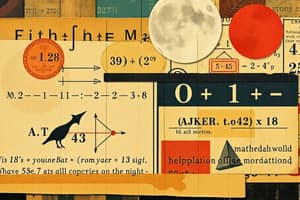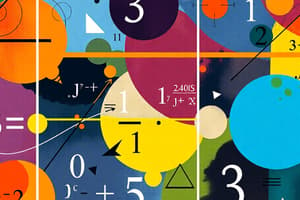Podcast
Questions and Answers
Which mathematical concept primarily focuses on determining whether statements are true or false using logical connectives and quantifiers?
Which mathematical concept primarily focuses on determining whether statements are true or false using logical connectives and quantifiers?
- Matrix Algebra
- Symbolic Logic (correct)
- Number Theory
- Sequences and Series
What is a primary focus of the study of number theory?
What is a primary focus of the study of number theory?
- Convergence of infinite sums
- Analysis of real-valued functions
- Properties of integer numbers, such as prime numbers and divisibility (correct)
- Operations on rectangular arrays of numbers
Which of the following best describes the concept of a function?
Which of the following best describes the concept of a function?
- A relationship between input and output sets where each input is associated with exactly one output. (correct)
- An infinite list of numbers following a specific pattern.
- A rectangular array of numbers used to solve linear equations.
- The sum of terms in a numerical progression
What distinguishes a sequence from a series?
What distinguishes a sequence from a series?
What is a primary mathematical application of matrices?
What is a primary mathematical application of matrices?
Which branch of mathematics uses variables and equations to represent unknown quantities?
Which branch of mathematics uses variables and equations to represent unknown quantities?
Which mathematical field is primarily concerned with rates of change and accumulation?
Which mathematical field is primarily concerned with rates of change and accumulation?
Which mathematical concept deals with the study of shapes, sizes, and positions of objects in space?
Which mathematical concept deals with the study of shapes, sizes, and positions of objects in space?
What is the primary focus of the field of statistics?
What is the primary focus of the field of statistics?
What concept involves the use of propositions and valid reasoning?
What concept involves the use of propositions and valid reasoning?
What is the term for a well-defined collection of objects?
What is the term for a well-defined collection of objects?
According to the concepts, which of the following is used to provide tools for practical applications in design, architecture, and engineering?
According to the concepts, which of the following is used to provide tools for practical applications in design, architecture, and engineering?
Which of the following operations is NOT a part of basic arithmetic?
Which of the following operations is NOT a part of basic arithmetic?
Flashcards are hidden until you start studying
Study Notes
Fundamental Concepts
- Mathematics is a system of logic and reasoning used to describe quantitative relationships, patterns, and structures.
- It uses symbols and formal languages to represent and manipulate abstract concepts.
- Key branches include arithmetic, algebra, geometry, calculus, and statistics.
- Mathematical concepts are used across disciplines like science, engineering, computer science, and finance.
Arithmetic
- Deals with basic operations: addition, subtraction, multiplication, and division of numbers.
- Includes concepts of integers, rational numbers, and irrational numbers.
- Studies properties like commutativity, associativity, distributivity, and order relations.
- Fundamental for practical calculations and understanding of numerical relationships.
Algebra
- Extends arithmetic by introducing variables and equations to represent unknown quantities.
- Focuses on solving equations and manipulating expressions involving variables.
- Includes linear equations, quadratic equations, and systems of equations.
- Important for modeling real-world problems and solving for unknowns.
Geometry
- Studies shapes, sizes, and positions of objects in space.
- Covers plane geometry (2D shapes) and solid geometry (3D shapes).
- Includes concepts like lines, angles, triangles, circles, and volumes.
- Provides tools for practical applications in design, architecture, and engineering.
Calculus
- Deals with continuous change and motion in mathematical functions.
- Includes differential calculus (rates of change) and integral calculus (accumulation of quantities).
- Fundamental in physics, engineering, and economics for modeling processes involving continuous change.
- Concepts like derivatives and integrals form the basis for understanding change.
Statistics
- Involves collecting, analyzing, and interpreting data.
- Uses measures of central tendency (mean, median, mode) and variability (standard deviation).
- Makes use of graphs and charts to visualize data patterns and distributions.
- Important for understanding populations and making informed decisions based on empirical evidence.
Sets
- A well-defined collection of objects, called elements.
- Sets can be finite or infinite.
- Set operations include union, intersection, and complement.
- Important in many branches of mathematics and computer science.
Logic
- The study of valid reasoning and argumentation that involve propositions.
- Uses propositions and symbolic logic to evaluate statements as true or false.
- Concepts like logical connectives (conjunction, disjunction, implication), quantifiers (∀, ∃), and tautologies are essential to formal mathematical arguments.
- Used in proving theorems and validating mathematical statements.
Number Theory
- Studies properties of integer numbers, like prime numbers, divisibility, and modular arithmetic.
Functions
- A relation between a set of inputs (domain) and a set of outputs (range).
- Functions can be represented by equations, graphs, or tables.
- Important concept in many branches of mathematics.
Sequences and Series
- Sequences are ordered lists of numbers.
- Series are the sums of sequences.
- Important for modeling patterns and calculating sums.
Matrices
- Rectangular arrays of numbers.
- Used for representing linear transformations and solving systems of linear equations.
Studying That Suits You
Use AI to generate personalized quizzes and flashcards to suit your learning preferences.




